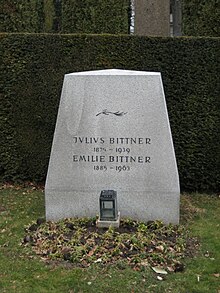Julius Bittner

Julius Bittner (born April 9, 1874 in Vienna ; † January 9, 1939 there ) was an Austrian composer .
Life
The son of a judge started out as a lawyer himself. During his studies he became a member of the Vienna fraternity of Alania in 1893 . Until 1920 Bittner worked as a judge in Wolkersdorf in the Weinviertel in Lower Austria, 1920–1922 as an official in the Ministry of Justice. In addition, Julius Bittner became one of the best-known and most-performed Austrian opera composers of the first half of the 20th century, but gradually fell into oblivion after the Second World War as a typical representative of late romantic opera in the tradition of Richard Wagner . Many of his operas deal with Austrian-Alpine themes and are mostly based on self-written libretti . He is considered a typical representative of the Austrian Volksoper. Julius Bittner (who was given the somewhat declassing nickname “ Anzengruber der Oper” by critics ) can certainly be equated with his better-known contemporary Wilhelm Kienzl in terms of musical importance . The opera Das Höllisch Gold (1916) is his most successful opera, it has made its way through many stages in Germany. His musical approach is firmly rooted in song.
For years Bittner worked as a columnist for the Neue Freie Presse , the Österreichische Rundschau and Wiener Mittag. He also worked as a music critic for foreign newspapers for many years. From 1918 to 1922 he edited the magazine “Der Merker” together with David Josef Bach .
Bittner was married to the contralto Emilie Werner. He received numerous prizes and honors. In 1925 he became a member of the German Academy of the Arts in Berlin . In 1936 the Reichsender Berlin erroneously put him on a black list of cultural workers who were no longer allowed to be employed in National Socialist Germany , although he was exempt from this “stain”.
In 1964, Bittner's estate was taken over by the Vienna City Library ; it includes almost all of the composer's works in autograph sketches, textbooks, scores and piano reductions.
His remains rest in a grave of honor in Vienna's central cemetery (group 32 C, number 15).
Works
Operas (selection):
- Hermann (1898)
- Alaric (1899)
- Die Rote Gred (premiered under Ludwig Rottenberg on October 26, 1907 in Frankfurt am Main. The Vienna premiere under Bruno Walter took place at the k. U. K. Hofoper Vienna on April 10, 1908. See essays in Neue Freie Presse (Vienna), 28. October 1907, p. 7, and April 11, 1908, pp. 1-3.)
- The musician (premiere by Bruno Walter at the k. U. K. Hofoper 1909)
- Der Bergsee (WP Vienna Hofoper 1911)
- Hellish Gold (Premiere Darmstadt 1916)
- Dear Augustin , Wiener Singspiel (WP Wiener Volksoper, 1917)
- Die Kohlhaymerin (UA Vienna Opera Theater 1921)
- The Rose Garden (premiered in Mannheim 1923)
- Mondnacht ( World Premiere Berlin, Deutsches Opernhaus 1928) Dedicated to Alma Mahler-Werfel .
- The violet (premiere Vienna, State Opera 1934)
- The Maestro (1931)
- The blue diamond (1937)
- The Rosary Festival (1937/38, unfinished)
In addition, Julius Bittner a. a. 2 symphonies, theatrical music for dramas by Shakespeare and folk pieces by Nestroy and Raimund , chamber music works (including two string quartets) and songs, dances from Austria and the approximately 90-minute, large-scale choral work Great Mass and Te Deum. Bittner's First Symphony (F minor) was premiered in 1923 at the Wiener Musikverein: Felix Weingartner conducted the Vienna Philharmonic . Erich Kleiber conducted the first performance in Berlin . Almost a century later, the first CD recording of the work came on the market: Dmitry Vasiliev recorded the symphony with the Siberian Symphony Orchestra for the British label Toccata. On the CD ( Julius Bittner Orchestral Music, Volume One) the symphony is coupled with the patriotic tone poem Vaterland, composed at the beginning of the First World War .
Awards
- 1915 Mahler Prize
- 1919 Raimund Prize
- 1925 Art Prize of the City of Vienna
- 1937 State Prize for Music and Literature
literature
- Bittner Julius. In: Austrian Biographical Lexicon 1815–1950 (ÖBL). Volume 1, Verlag der Österreichischen Akademie der Wissenschaften, Vienna 1957, p. 89.
- Werner Bollert: Bittner, Julius. In: New German Biography (NDB). Volume 2, Duncker & Humblot, Berlin 1955, ISBN 3-428-00183-4 , p. 280 f. ( Digitized version ).
- Hermann Josef Ullrich : Julius Bittner, Verlag Elisabeth Lafite, Vienna 1968
- Helge Dvorak: Biographical Lexicon of the German Burschenschaft. Volume II: Artists. Winter, Heidelberg 2018, ISBN 978-3-8253-6813-5 , pp. 70-71.
Web links
- Literature by and about Julius Bittner in the catalog of the German National Library
- Entry on Julius Bittner in the Austria Forum (in the AEIOU Austria Lexicon )
- Sheet music and audio files from Bittner in the International Music Score Library Project
- List of stage works by Julius Bittner based on the MGG at Operone
Individual evidence
- ↑ Erich Schenk: Little Viennese Music History , Vienna 1946
- ^ Hermann Ullrich: Julius Bittner , Vienna 1968, p. 25
- ↑ Oliver Rathkolb: Loyal to the Führer and God-Grace. Artist elite in the Third Reich , Österreichischer Bundesverlag Vienna, 1991, p. 25f
- ^ Salzburger Volksblatt, December 15, 1924
- ^ Wilhelm Sinkovicz : Julius Bittner: A late romantic and his fatherland. In: Die Presse , March 27, 2019, accessed June 4, 2019.
| personal data | |
|---|---|
| SURNAME | Bittner, Julius |
| BRIEF DESCRIPTION | Austrian composer |
| DATE OF BIRTH | April 9, 1874 |
| PLACE OF BIRTH | Vienna |
| DATE OF DEATH | January 9, 1939 |
| Place of death | Vienna |

